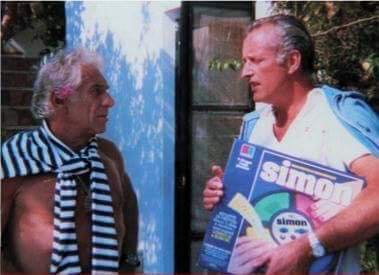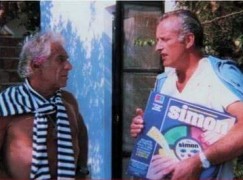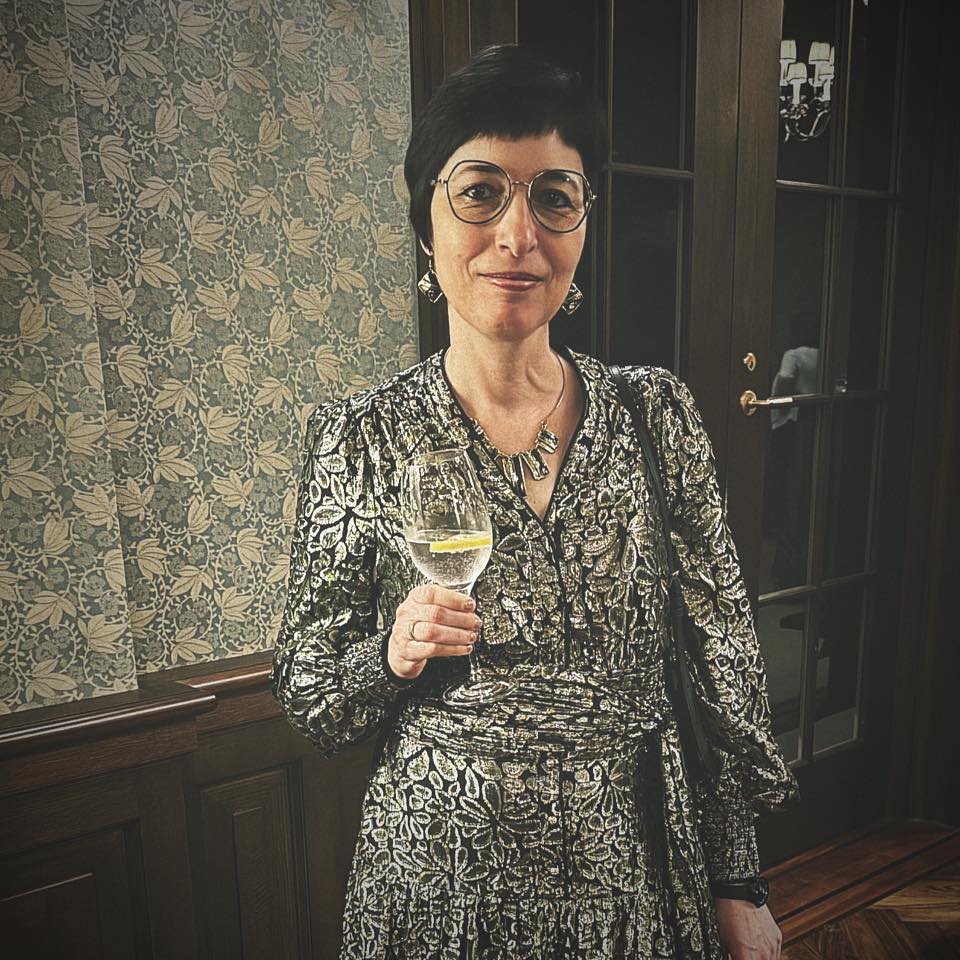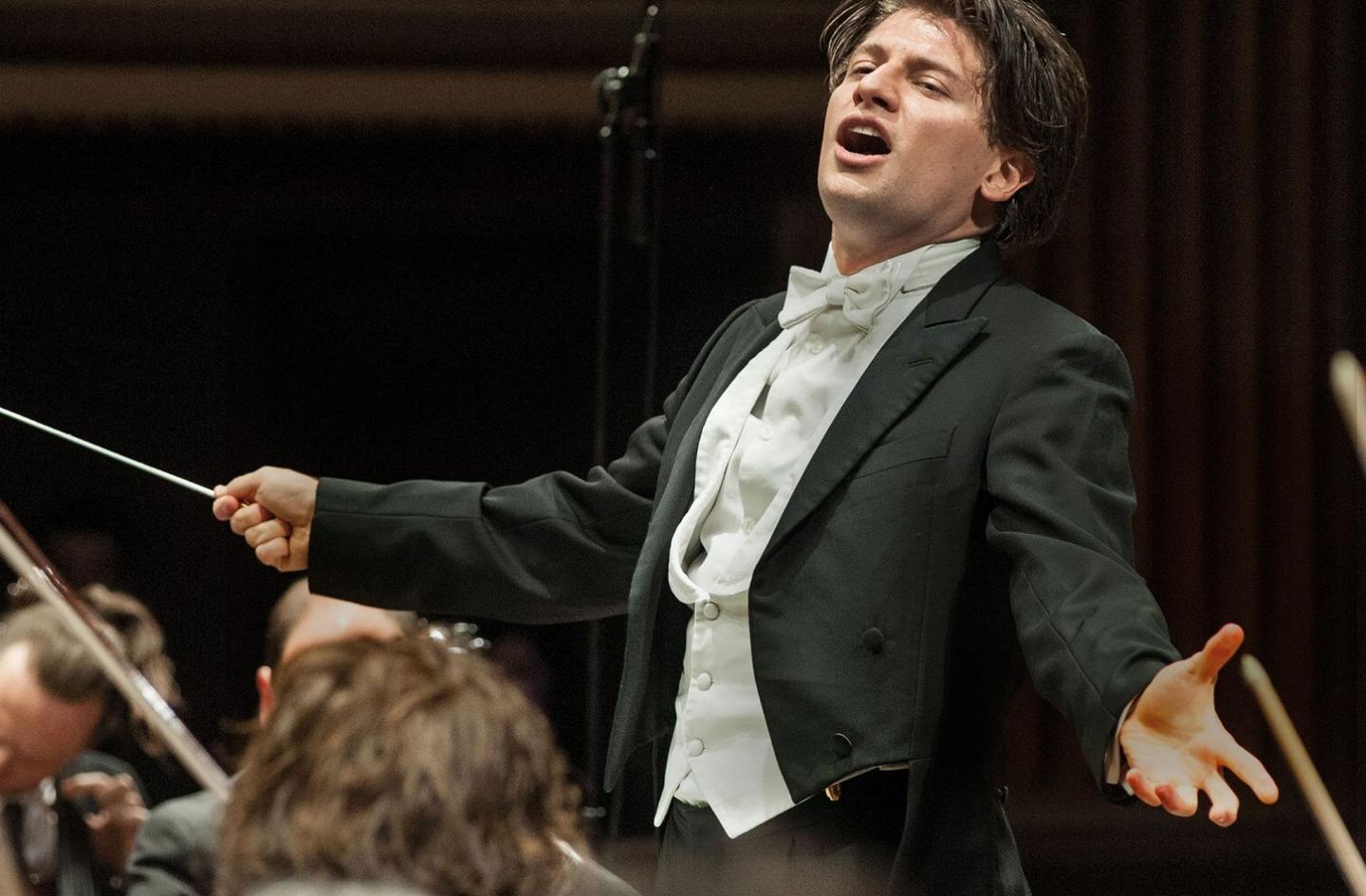Carlos Kleiber would have been 90 today
mainThe greatest conductor of his generation was born on July 3, 1930 and died on July 13, 2004. He had retired ten years earlier and his wife had predeceased him by a few months.
Sad to acknowledge that in the 16 years since his passing no-one has come close to taking his place as a quirky, my-way, inspirational, anti-celebrity, musicbiz-averse, totally trustworthy and ever-surprising leader of musicians.

It’s starting to look as if we will never see his like again.






CK photographed with the greatest conductor of his generation.
And what were they saying?
LB – I’ve just been orchestrating my third symphony and practising piano for a Mozart concerto tomorrow.
CK – I can’t do any of those things, so I play Simon. But with my lovely smile and gestures they’ll still be fawning over me when I’m 90.
Only a US-American would – motivated by patriotic pride – call Bernstein (no doubt a major figure in music of the 20th century for musical and non-musical reasons) the greatest conductor of his generation.
Thank God I’m not from the U.S and A. (I’m one of yours, Frau).
This comment was more to express my view that CK was not the greatest blah…
I think it’s safe to say, and most professional musicians would probably agree, that he was the greatest conductor of all time. If we do need a superlative.
The term “(one of the) greatest xyz of his/her generation” has become so ubiquitous it can be found in every second concert-programme biography.
This is closely followed by “one of the most sought-after conductors/violinists/cellists/ophicleidists”…
Carlos Kleiber’s music-making was special and deserves every superlative, even if we may never understand the mystery of what exactly it was that made his concerts so memorable.
We have no direct evidence of the conducting of Wagner, Mahler, Nikisch just for a start.
Kleiber came in the middle of the 70’s in Bayreuth and it was a big success.
https://en.wikipedia.org/wiki/Simon_(game)
Nikisch is available on film (1913) and recordings. Listen to the portamento!!!
https://www.youtube.com/watch?v=p4OTCfV9xoM
Here is Nikisch sans sound:
https://www.youtube.com/watch?v=XuFReWTLMm0
Koussevitzky never took any formal conducting classes, but learned to conduct watching other conductors in concert. He spent more time watching Nikisch than any other when he lived in Berlin between 1905 and 1909. He also with his wife’s money hired our Nikisch’s band, the Berlin Philharmonic for his first concert as a conductor in 1909. He also watched Mahler and Glazunov among others. Bernstein credits Koussevitzky with his conducting technique; so by transference, Nikisch lives in all of Bernstein’s pupils.
Certainly by all accounts of the time Nikisch was considered to be the greatest conductor of the German speaking world. When he took the Berlin Philharmonic to Paris for the first tour of a German orchestras in France in 1897, the French press were not kind to him and compared their Concerts de Conservatoire under Taffanel to be superior. Of course Taffanel is barely remembered and the French Nationalism at the time was way over the top. The foreign press reviewing those concerts raved.
Hi Luca: there is no known film of Mahler conducting. There is, however, silent film (from front and back) of Nikisch conducting. And, there is a strange film of ‘Wagner’ conducting, this taken of a man who had a very successful career in Europe impersonating famous people he observed. People of the era say he got Wagner exactly right. Both are at Stanford.
Kleiber music was important but I don’t think that he deserves every superlative.
But we’re going to give them to him anyway!!
Haha! Yes, I know. Two years ago I posted the following on my Facebook page (I could not find a link to post here, so here it goes):
VERITAS!
I keep seeing musicians of different vintage being described in their official bios as “one of the foremost/greatest/most sought-after (whatever) of “his/her generation” or “our time”. It sort of makes you wonder how the world can cope with so much sublime musical greatness at any one time.
I am considering adjusting my current bio to something like this:
RICARDO WHATSHISNAME
Universally disregarded as one of the truly insignificant violinists and composers of our time, RW was born in Spain and studied there and elsewhere with quite a few people we will not mention, as RW does not enjoy namedropping.
Ricardo has worked with some of the greatest musicians in the planet. This has not made him one bit more interesting than he would have been otherwise. He has performed in two continents and has never been accused of boring his audience.
On a good night (which happens every six or seven years) he can hold his corner alongside the best of them.
He does most of his most interesting work for little or (most often) no money. He would love to teach for free but circumstances compel him to receive remuneration for passing on the little he knows on to younger players.
RW has received one honour in his career: the honour of performing a solo concerto at Checkpoint Charlie at an outdoor event commemorating the 45th anniversary of the Berlin Wall. The honour was so great that a fee was not included nor was the cost of his travel to and from Berlin or his accommodation during his four-day-long stay there.
RW is his own favourite composer *1) and prefers his music not to be played than it being played badly. That’s probably why you have never heard any of it.
RW appears in over 40 CDs and has produced quite a few of them himself. As he has no management and cannot afford to promote himself or his work, very few people know about these CDs, which are likely not to recoup during the lifetime of his great-grandchildren.
He was once within a meter’s distance of Itzhak Perlman *2)
RW avers that he is (quote) a happy man, a happy man doing the best he can, the best he can (unquote)
*1) Any honest composer will say that about him/herself
*2) Sole namedropping indulgence here.
CK the “greatest conductor of all time”? I think not.
Great, yes. Indisputably. But not the GOAT.
Ever thought about young women and men being sick of old people telling them to be anti-celebrity, musicbiz-averse, but also quirky, my-way, inspirational, totally trustworthy and ever-surprising? Give it a try and tell your kids …
What is the ‘Simon’ album(?) he has in his hands in the captioned photo?
Or is it the game – ‘Simon says’?
It was a shield to keep the gay Bernstein and Zeffirelli away from Kleiber!!! That’s why Kleiber took women with him when he stayed with FZ.
Did he tell you that himself Sue?
Not everyone finds him as sexy you do…
Yes because among your ilk gay is contagious whereas COVID-19 isn’t. Typically but sadly despicable.
https://boardgamegeek.com/boardgame/5749/simon
It’s not an album, but a computerised game popular in the 80s. I had one as a kid, and if I recall correctly it involved a sequence of lights and sounds that were played with increasing length and complexity, and the object was to recreate it accurately. Come to think of it, perfect hobby for a conductor!
it’s not an album actually, but the game ‘Simon’.
https://www.amazon.co.uk/Hasbro-Gaming-Classic-Simon-Game/dp/B0719JFC2X
which makes that photo even more brilliant i think!
It’s an American board game from the 1970’s called Simon Says. It’s a wonderful photo as it captures his character so perfectly, his irrepressible rascality, as Alan Watts, would say. Carlos never abandoned his inner child and that playfulness is apparent in his personality and in many of his performances. He was guided by the non-/anti- dogma of Krishnamurti. Consequently, he was utterly disinterested in (or at times thoroughly amused by) the silly games of status that have a vice grip on the world (especially the music business), yet was wholly aware of how to exploit them for the sake of art. For those of us that seek soulful music-making, he is sorely missed.
Wonderful words. Thank you.
A game! https://www.ebay.com/itm/Vintage-Simon-Says-Memory-Electronic-Game-1897-2013-Tested/143639623808?hash=item217196b880:g:b84AAOSwUSle8eed:sc:USPSPriority!45342!US!-1
Simon was (is ) a swipe game.
I have big respect for Carl Kleiber and what he gave to the art. His story is fascinating (excellent film I Am Lost To The World). But it’s impossible to say that a conductor who recorded and directored a number of concerts so famelic is the greatest of his generation. Haitink and Abbado were better for me. And the way Kleiber many times withdrew of his duties was not elegant for the musicians and for the public.
Yes, Kleiber was flawed. He seemed to grow bored with conducting and had a variety of other interests. In Japan he was known as the “cancellation devil” and he could be churlish, as he often was in Japan.
He had the artistic temperament of a man deeply uncertain about his own musical soul, which was not commensurate with the adulation he received. Ergo, he played the game of “I don’t really care” to attempt to disguise this.
Did he conduct (or premiere) any music by a living composer, and did he advocate any of the music of his time? I don’t know of a single instance, and I would like to know more about this, please.
I don’t think he did modern music at all he was famous for his Tristan record a refenrence in the 70’s, recordings from DG of Schubert and Beethoven but he didn”t recorded all the symphonies. There were some rumors that DG wanted him to come in Berlin after Karajan.
He has been invited by the BPO to succeed Karajan but he refused. Abbado was the second choice. He won over Maazel.
Not a rumor. That was what happened. Read ‘Corresponding with Carlos’ by Charles Barber.
Good point.
Most great conductors were involved with the music their own time to some extent. Even the conductor CK admired more than any other (Karajan) conducted Ligeti,Messiaen, Penderecki , Henze , Tippett and Walton.
No doubting the charisma and magic of Kleiber though.
His father, Erich Kleiber, certainly did.
He’s holding a Simon “memory game”! https://youtu.be/-iUUWYOf97k
Maybe better using this version
https://www.youtube.com/watch?v=DNYk0jI1cio&t=302s
Better orchestra and a precise opening chord!
Not to mention 6:45 . Ouch!
An inspiring conductor. A tragedy that he was so adverse to recording. His conducting technique is as unsurpassed as his interpretations. No orchestra today would be able to give him sufficient rehearsal time.
Both to recording and to performing.He gave 98 concerts in all his life. Couple of hundreds of opera performances.
Very well said Norman. I only went to a handful of operas and concerts conducted by Kleiber but they were all wonderful and unforgettable musical experiences.
The best conductor ever! Rest in Peace, Carlos!
So young at 74. But in terms of lasting legacy:
1) Kleiber has more disciples (in terms of conducting style) today than any other conductor before or after him. While one can imitate his style, one has yet to reproduce his genius.
2) The amazing thing about him is that, though his repertoire was very, very limited, what he did conduct is on the top 10 if not the top 5 of *everyone’s* (amateurs and critics alike) list of favorite recordings of those particular pieces.
Compare that to any number of wide-ranging, long-living influential music directors of any generation — and except for Furtwangler and Karajan — few if any of their works have survived the test of time.
Today I have a feeling that Kleiber is 50-50 famous for his music and for his story. But it’s great that we can find on Youtube the two new year concerts he did and the Beethoven concertos he did with the Concertgebouw. I’am sure that in 2050 we will continue to talk about him
When I watch Kirill Petrenko I immediately think of Kleiber. And also Andris Nelsons.
Sam: Carlos Kleiber had in fact a huge repertoire, he only dedicated himself to a few selected works, wich he made shine with thrilling results, insight and consumate elegance. Bohéme, Otello, Tristan, Fledermaus, Rosenkavalier, never a dull moment with him, never a routine performance from him. But in his early years he had even conducted Don Carlo, Falstaff, even Baroque and operettas and even Singspiele.
The same on the concert stage; just a few Beethovens, a few Schuberts and Brahms’, a few Waltzes. He was able to show with his consumate elegance and his very own personal coreography just everything: character, colour, Nuance, expression, balance, even the crocodile tears in the music. Some of us can mourn about not having been left with a Carlos version of the Beethoven Ninth or Fidelio, or a Brahms Deutches Requiem or a Tchaikovsky symphony or a Strauss Salome. But perhaps that’s as well; we might have been disappointed. He didn’t leave testimony of “everything”, hence the Myth of Carlos Kleiber.
Wich brings me to the subject of imitators and masturbatoric fools in front of a mirror; One might be able to make a perfect Kleiber or Bernstein or Karajan “imitation” by gestures, but what might come out of it is another thing entirely.
One thing was to live a whole life with a few scores and conduct them better than anyone else, having each time found more substance and something new to say, as with the Beethoven Sonatas. Another thing is fooling the orchestra and the audiences. But in the short run, an orchestra can’t be fooled. If you can’t ignite something through your own sparkle and insight, but are there for only mediatic reasons or for being an imitator, or for treating the orchestra like a mirror, they’ll giggle at you, or simply let you know. Lenny and Carlos were geniuses, and they had their own way of doing things. Period.
Just think …a couple of hours back he was a dead 89.and a couple years back dead as a doornail and yet the Beethoven 7th. goes on without Carlos.How can that be ?
They’re both de-composing.
Anybody who ever had the privilege of attending several Kleiber concerts, as I did, will know what an extraordinary individual he was and how compelling was the way in which his music-making communicated itself to audiences.
I fully agree with you. Five Otellos, three Rosekavaliers, the first NY concert, two concerts with the VPO and specially his first concert with the BPO are experiences I will never forget.
Kleiber was a legend.
What’s the date, place and circumstance of the (interesting) photo?
I admired Kleiber as much as anyone, but IIRC he led a total of 96 orchestral and about 400 opera performances in his entire career, with a very limited repertoire. True, just about every time he conducted was an EVENT, and even the greats of our time all seem think he was the greatest. But it may be a little unfair to compare him to people who actually conducted for a living.
Isn’t it quality and not quantity? I’d have thought so.
An unforgettable conductor. I was privileged to have heard his Boheme, Otello, Traviata and most especially a heavenly Rosenkavalier at the Met. He knew lots of music, conducted very little of it but what he did conduct he did superbly. This is the conductor almost every other conductor admires immensely (and most conductors don’t admire any others immensely, or perhaps that much at all!). Bernstein told the NYPO at a rehearsal that they should go hear Kleiber who was conducting at the Met at the time. For those interested in a fascinating insight into his life I heartily recommend the book “Conversations with Carlos” by Charles Barber – not for its short biography but for the hundreds of letters CK wrote to Barber over many years that give a wonderful insight into the most inscrutable of musicians. CK was also a crazy Stokowski fan, a great admirer of that conductor’s Brahms. He also admired Sawallisch and Karajan. He loved Emily Dickinson. He detested Abraham Lincoln. He was a strange cat but, according to one Met player I knew very well, he was “hands down the greatest of them all.”
Ah, I see you have read “Conversations with Carlos”.
He was also a fan of Sir Adrian Boult!
True. And Klaus Tennstedt.
But not Celibidache
Much loved and very much missed. My relatives are still around at 90 and so should you be, Carlos!!
Do you think someone of his talent & profile, as you described, would get opportunities today Norman? It takes talent to appreciate talent and in these days the talent to read a score and wave your hands in time (and sometimes behind) the music is often enough to secure a buoyant and even highly successful career. Being more than willing to say ‘yes’ to anything is also a high priority.
It is true that such superlatives can be inappropriate. And yet I saw Domingo, no stranger to conducting himself, once say in an interview that: (1) Kleiber was on a completely different level than all living conductors (2) Karajan had offered him Berlin but he had turned it down (3) if he had accepted, Berlin would easily have been the best orchestra of all time. So, maybe sometimes such a superlative is appropriate after all.
Certainly a supremely talented conductor but one wonders whether rarity blue has a part to play in his legacy, and that if he had recorded more he might have been less reverenced?
How can any artist like CK with a minute repertoire be dubbed the greatest? To my mind, the critique is especially relevant for a musician who is limited to interpreting what has been created by another? As much as I admire his VPO recordings of the Brahms 4th and Beethoven 5th/7th I find his Brahms 2nd and Beethoven 4th second-rate. To expect a conductor to perform everything memorably is ridiculous but imo to limit yourself as severely as CK opted to do precludes being viewed as the greatest.